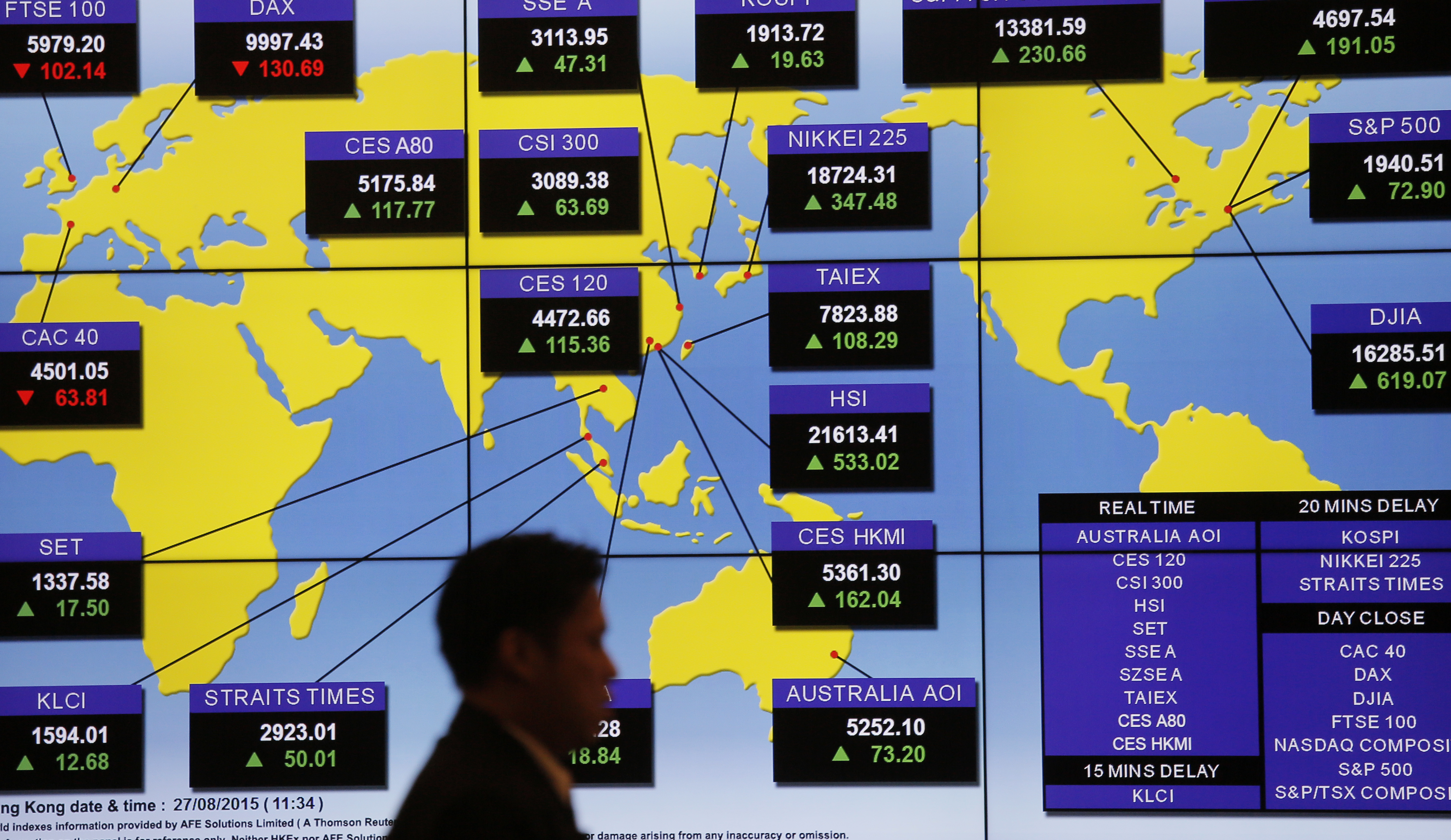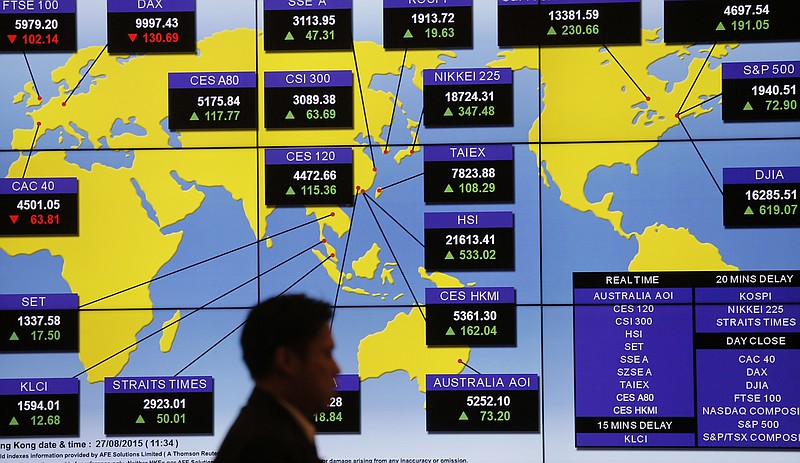 FILE - In this Aug. 27, 2015 file photo, a man walks past a bank's electronic board showing the share index around the world at Hong Kong Stock Exchange. Investors have yanked $40 billion from emerging-market stocks this year, a record pace of withdrawals, as a slowdown in China has hammered companies that supply raw materials. (AP Photo/Vincent Yu, File)
FILE - In this Aug. 27, 2015 file photo, a man walks past a bank's electronic board showing the share index around the world at Hong Kong Stock Exchange. Investors have yanked $40 billion from emerging-market stocks this year, a record pace of withdrawals, as a slowdown in China has hammered companies that supply raw materials. (AP Photo/Vincent Yu, File) Stock markets plunged again Tuesday, continuing Wall Street's rocky ride, after gloomy economic data out of China rekindled fears that the world's second-largest economy is slowing much faster than anticipated.
KEEPING SCORE: The Dow Jones industrial average lost 351 points, or 2.1 percent, to 16,176 as of 11:06 a.m. Eastern time. The Standard & Poor's 500 index declined 41 points, or 2.1 percent, to 1,931 and the Nasdaq composite fell 77 points, or 1.6 percent, to 4,699.
CHINA MANUFACTURING: An official index of Chinese manufacturing fell to a three-year low last month, another sign of slower-than expected growth in that country. The manufacturing index, which surveys factory purchasing managers, dropped to a reading of 49.7 points in August from 50.0 in July. A reading below 50 indicates a contraction.
China's stocks sank on the news and China's Shanghai Composite Index closed down 1.2 percent. The index has plunged 34 percent in the last three months.
The Chinese economy has been the focus for investors all summer and concerns have intensified in the last three weeks. China devalued its currency, the renminbi, in mid-August. Investors interpreted the move as an effort to boost economic growth.
"Monday's relatively peaceful markets are a distant memory as Chinese data and shares sparked another severe overnight reaction from the developed world," said John Briggs, head of fixed income strategy at RBS.
ACROSS THE GLOBE: Markets in Europe were broadly lower, with Germany's DAX down 2.7 percent, France's CAC-40 falling 2.8 percent and the U.K.'s FTSE 100 index falling 3.1 percent.
Japan's Nikkei 225 was also volatile, dropping 3.8 percent. The Hang Seng in Hong Kong sank 2.2 percent. Stocks also fell in South Korea and Australia.
SAFETY: Faced with broad declines, investors moved into traditional havens like bonds and gold. Bond prices rose, pushing down the yield on the benchmark 10-year Treasury note to 2.17 percent from 2.22 percent on Monday. Gold rose $5.30, or 0.5 percent, to $1,138.20 an ounce.
BAD MONTH: August was a miserable month for investors. Worries over China's slowdown and the timing of a possible interest rate hike by the Federal Reserve pushed shares sharply lower. Moves by the Chinese central bank helped to stabilize the markets, at least temporarily, but the Standard & Poor's 500 still finished August down 6.3 percent. That's its worst showing since May 2012.
FED WATCH: Along with worries about China, speculation about whether or not the Federal Reserve will raise interest rates as soon as this month continues to weigh on markets. Traders say a lot hinges on the August jobs report, released this Friday. Economists are forecasting that U.S. employers created 220,000 jobs in August, and that the unemployment rate fell to 5.2 percent.
The Federal Reserve meets September 16 and 17, and some economists are predicting that policy makers will be confident enough in the U.S. economic recovery to raise interest rates for the first time in almost a decade.
But while policy makers are mostly focused on the U.S. economy, they cannot ignore the problems in China and the impact on the global economy, traders say.
"China's problems are totally a concern for the Fed," said Tom di Galoma, head of rates trading at ED&F Man Capital. "With inflation remaining low here, I just don't a reason why they would raise rates,"
OTHER DATA: Here in the U.S., a private survey showed that growth in US manufacturing slipped last month to its slowest pace in more than two years. The Institute for Supply Management, a trade group for purchasing managers, reported Tuesday that its manufacturing index slid to 51.1 last month from 52.7 in July. It was the second straight drop, and marked the weakest reading since May 2013.
ENERGY: Benchmark U.S. crude fell $3.16 to $46.04 in electronic trading on the New York Mercantile Exchange. It had surged $3.98, or nearly 9 percent, to $49.20 on Monday after the U.S. Energy Department cut its oil output estimate.
CURRENCIES: The dollar fell to 119.97 yen from 121.20 yen on Monday. The euro rose to $1.1252 from $1.1225.
